Free non-contact melting- suspended or levitation induction melting
Views Send Enquiry
Free non-contact melting pot - Containerless Processing -
The crucible-melting method is a technique for producing high-purity alloys for physical, chemical or analytical applications.
With this method, particularly alloys of reactive materials such as Is titanium, for precision casting of high strength components for medical implants (also in dental technology) and investment cast components made of Aeronautics and Astronautics, when the material chemically reacts with the crucible walls or contaminated by these. Further, the method of melting materials are used, for which there is, due to the high melting temperature no suitable crucible materials.
The method prevents contact between the melt and the crucible wall or engobe covering them to prevent chemical reactions with the latter. Further, the crucible-melt prevents contamination of the melt by the inclusion of particles. When re-solidification of the melt, the crucible wall triggered by an uncontrolled nucleation of solidification process, which can lead to irreproducible properties of the material. Due to the crucible melts, the free-cooling and solidification processes can be controlled, which allows a control of the crystal structure.
There are three known methods for crucible-free melt. In all three methods, the inductive heating is preferred because of its higher efficiency. The difference is used in the levitation. It is required as a counter-force levitation of gravity to lift the material first, and then the melt from the crucible, or a base and to keep stable in the electromagnetic field of the induction coil. The levitation force must contain an additional component, which compensates for the electrostatic repulsive force of the induction coil.
Positionierendes acoustic levitation melting
The acoustic positioning flash smelting works with a levitation force and position, which is generated by overlapping sound waves in a compressed gas. Advantage of the process is the complete absence of feedback as the levitation force generated by the electromotive force generated by said inductive heating. Furthermore, this force also acts on electrically non-conductive materials, which, however, also can not be inductively heated then.
A disadvantage in many processes is the dependence of the process of the presence of a gas, through the inevitable impurities and thermal conductivity many interesting processes, such as the undercooling of the melt makes it impossible for the production of amorphous metals or titanium casting.
The acoustic positioning levitation melting is the first choice for materials research in poorly conductive materials, such as glass, ceramics and some semiconductors.
Electromagnetic levitation melting positionierendes
Positioning the electromagnetic levitation melting operates with a electromagnetic field as replacement crucible, which consists of the superposition of at least two sub-fields of different frequency or phase. The material in this field levitated, melted, the melt mixed by the electromotive forces and possibly wiedererstarrt in limbo. By a corresponding control of the components of the electromagnetic field, the melt is levitated positioned and temperature - relatively independent of the electrical conductivity is temperature-dependent change of the material - controlled.
Advantage is that the electromagnetic positioning levitation melting in a high vacuum as well as operate under high gas pressure, which allows a wide variety of possibilities of process control. Furthermore, by the process conditions, high-purity maximum possible subcooling of the melt, which leads to extremely high solidification rates. The directional solidification can be easily influenced by a mechanical or electromagnetic trigger.
Even higher solidification rates can be achieved by a subsequent splat Cooler. Here, the sub-cooled or sub-cooled sample of two water-cooled copper temples mechanically pressed together (gesplattet) to achieve a maximum rate of cooling. The process operates at all times 100% free and without crucible atmospheric influences.
A disadvantage is the relatively low maximum mass of the molten material, which is limited by the force of gravity and the viscosity of the melt.
The electromagnetic levitation melting positioning is the first choice material for scientific studies on metals.
Melting in cold crucible wall
The cold-wall crucible method - cold-wall Crucible - was developed in the 60s at Sellafield. The classical cold wall crucible consists of an annular wall palisade water-cooled copper elements. These are very close together but not touching each other. The floor consists of either a water-cooled copper plate or he is also segmented and connected to the palisades danebenbefindlichen segments.
The electromagnetic fields of the segments add up to the inner and outer sides of the palisade. The electromagnetic field is adapted to the geometry of the cold wall crucible wall, thereby forming a electromagnetic crucible. Thus, the cold wall crucible is used as a mechanical support of the electromagnetic field.
The main advantage of this method is the very large mass processable material. A disadvantage is the low efficiency of up to 40% of the generator power, which attracts a relatively high capital and energy costs. Furthermore, the material / cup contact is not completely excluded during melting and solidification as well as at the segment joints of the crucible.
The cold-wall crucible method is the first choice when it comes to the processing of masses which are larger than the laboratory specimens.
The crucible-melting method is a technique for producing high-purity alloys for physical, chemical or analytical applications.
With this method, particularly alloys of reactive materials such as Is titanium, for precision casting of high strength components for medical implants (also in dental technology) and investment cast components made of Aeronautics and Astronautics, when the material chemically reacts with the crucible walls or contaminated by these. Further, the method of melting materials are used, for which there is, due to the high melting temperature no suitable crucible materials.
The method prevents contact between the melt and the crucible wall or engobe covering them to prevent chemical reactions with the latter. Further, the crucible-melt prevents contamination of the melt by the inclusion of particles. When re-solidification of the melt, the crucible wall triggered by an uncontrolled nucleation of solidification process, which can lead to irreproducible properties of the material. Due to the crucible melts, the free-cooling and solidification processes can be controlled, which allows a control of the crystal structure.
There are three known methods for crucible-free melt. In all three methods, the inductive heating is preferred because of its higher efficiency. The difference is used in the levitation. It is required as a counter-force levitation of gravity to lift the material first, and then the melt from the crucible, or a base and to keep stable in the electromagnetic field of the induction coil. The levitation force must contain an additional component, which compensates for the electrostatic repulsive force of the induction coil.
Positionierendes acoustic levitation melting
The acoustic positioning flash smelting works with a levitation force and position, which is generated by overlapping sound waves in a compressed gas. Advantage of the process is the complete absence of feedback as the levitation force generated by the electromotive force generated by said inductive heating. Furthermore, this force also acts on electrically non-conductive materials, which, however, also can not be inductively heated then.
A disadvantage in many processes is the dependence of the process of the presence of a gas, through the inevitable impurities and thermal conductivity many interesting processes, such as the undercooling of the melt makes it impossible for the production of amorphous metals or titanium casting.
The acoustic positioning levitation melting is the first choice for materials research in poorly conductive materials, such as glass, ceramics and some semiconductors.
Electromagnetic levitation melting positionierendes
Positioning the electromagnetic levitation melting operates with a electromagnetic field as replacement crucible, which consists of the superposition of at least two sub-fields of different frequency or phase. The material in this field levitated, melted, the melt mixed by the electromotive forces and possibly wiedererstarrt in limbo. By a corresponding control of the components of the electromagnetic field, the melt is levitated positioned and temperature - relatively independent of the electrical conductivity is temperature-dependent change of the material - controlled.
Advantage is that the electromagnetic positioning levitation melting in a high vacuum as well as operate under high gas pressure, which allows a wide variety of possibilities of process control. Furthermore, by the process conditions, high-purity maximum possible subcooling of the melt, which leads to extremely high solidification rates. The directional solidification can be easily influenced by a mechanical or electromagnetic trigger.
Even higher solidification rates can be achieved by a subsequent splat Cooler. Here, the sub-cooled or sub-cooled sample of two water-cooled copper temples mechanically pressed together (gesplattet) to achieve a maximum rate of cooling. The process operates at all times 100% free and without crucible atmospheric influences.
A disadvantage is the relatively low maximum mass of the molten material, which is limited by the force of gravity and the viscosity of the melt.
The electromagnetic levitation melting positioning is the first choice material for scientific studies on metals.
Melting in cold crucible wall
The cold-wall crucible method - cold-wall Crucible - was developed in the 60s at Sellafield. The classical cold wall crucible consists of an annular wall palisade water-cooled copper elements. These are very close together but not touching each other. The floor consists of either a water-cooled copper plate or he is also segmented and connected to the palisades danebenbefindlichen segments.
The electromagnetic fields of the segments add up to the inner and outer sides of the palisade. The electromagnetic field is adapted to the geometry of the cold wall crucible wall, thereby forming a electromagnetic crucible. Thus, the cold wall crucible is used as a mechanical support of the electromagnetic field.
The main advantage of this method is the very large mass processable material. A disadvantage is the low efficiency of up to 40% of the generator power, which attracts a relatively high capital and energy costs. Furthermore, the material / cup contact is not completely excluded during melting and solidification as well as at the segment joints of the crucible.
The cold-wall crucible method is the first choice when it comes to the processing of masses which are larger than the laboratory specimens.
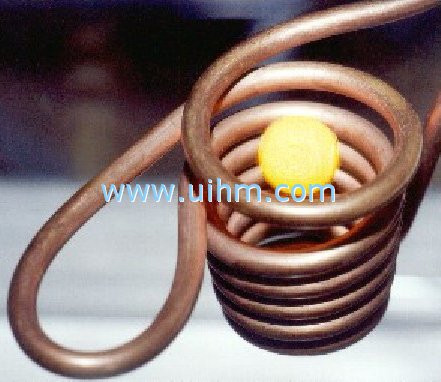
suspended induction heating
PDF: Free non-contact melting- suspended or levitation induction melting
Good
Bad
Hot
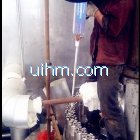
induction heating bolts from turbine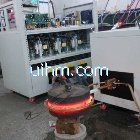
induction debonding from steel rod
induction debonding rubber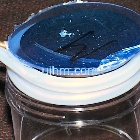
Releasing Fixture by Induction Heating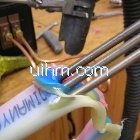
Remove plastic coating from steel tubes by Induction Heating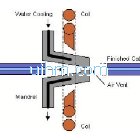
Induction Heating catheter tipping die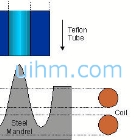
Induction Molding for teflon catheter tip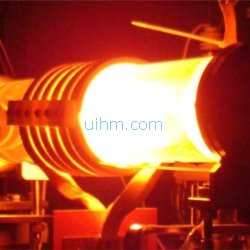
induction melting for crystal growth

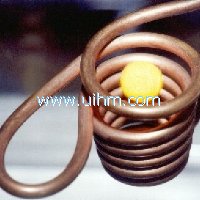
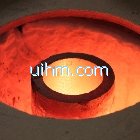
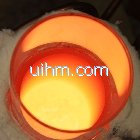
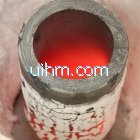
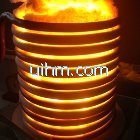

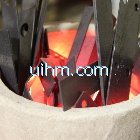
Newest Comment
We will like to inquire about your induction heating power supply, please send to us your catalogs and list of quantities,prices, Terms of payment and their Delivering time.
Regards
Ryan Erick ([email protected])
Sales Manager.
Ryan trading.
Post Comment